Welcome to the second newsletter for IC7: Affordable Heating and Cooling of Buildings
This newsletter is also available for download as PDF.
The objective of IC7: Affordable Heating and Cooling of Buildings is to make low-carbon heating and cooling affordable for everyone. Globally, buildings account for almost a third of final energy consumption, with space heating and cooling, and the provision of hot water, accounting for approximately half of this consumption.
For new and existing renewable heating and cooling technologies, innovation is required to improve competitiveness, efficiency, reliability and the potential for integration within energy management systems. This requires cross-border and cross-sector collaboration between Mission Innovation (MI) governments, private investors and research leaders. Ultimately, international collaboration will bring the best methods of affordable, low-carbon heating and cooling solutions to the global market as quickly as possible. Our second newsletter describes some of the collaborations taking place in delivering our objective. We hope you might already be involved in some of this work but if not please consider getting in touch with us to find out how you might be able to benefit.
Your IC7 Co-Leads

The Global Cooling Prize Receives Support from Sir Richard Branson
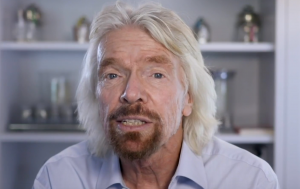
The Global Cooling Prize, launched in Delhi in November 2018 by the Indian Government and the Rocky Mountain Institute, has received support from businessman Sir Richard Branson. Sir Richard said “there are millions of bright minds that I believe could bring a solution to our global cooling challenge”.
The $3M #GlobalCoolingPrize aims to spur the development of technologies with 5x less climate impact than air conditioners being sold today, a vital innovation needed to help limit global CO<sub>2</sub> emissions. The prize competition is designed to develop solutions for non-air-conditioned buildings that do not use highly potent refrigerants and consume dramatically less energy yet provide consumers with the cooling that they need.
To learn more or take part, visit the competition website at: https://globalcoolingprize.org/
MI Gathering 2019: preparing for MI-4 in Vancouver
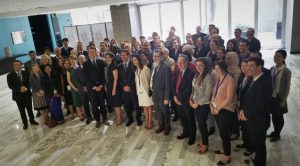 Bringing together all 25 MI countries and MI partners (IEA, IRENA, WEF, WEC, UNIDO), the MI gathering in Santiago in January provided a great forum to discuss the latest MI progress and prepare for the next MI Ministerial (MI-4, Vancouver 27-29 May 2019). Several new initiatives were discussed including the launch of a Champions programme and the signing of the Breakthrough Energy Europe agreement – providing investment in Africa to tackle the major global issues of the 21st century. New ideas to strengthen ongoing activities were discussed including Global Sustainable Energy Innovation Fund and piloting a Multilateral Call for cooperative R&D projects.
Bringing together all 25 MI countries and MI partners (IEA, IRENA, WEF, WEC, UNIDO), the MI gathering in Santiago in January provided a great forum to discuss the latest MI progress and prepare for the next MI Ministerial (MI-4, Vancouver 27-29 May 2019). Several new initiatives were discussed including the launch of a Champions programme and the signing of the Breakthrough Energy Europe agreement – providing investment in Africa to tackle the major global issues of the 21st century. New ideas to strengthen ongoing activities were discussed including Global Sustainable Energy Innovation Fund and piloting a Multilateral Call for cooperative R&D projects.
IC7 will be represented at the MI-4 ministerial meeting with a public-private roundtable on the topic of ‘’Scaling and Financing Sustainable Cooling Solutions’’. The proposed co-chairs for this roundtable, EC and UAE, also confirmed their readiness to lead on this effort. More information on all MI-4 activities to follow!
The Comfort and Climate Box
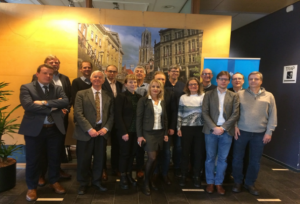 The “Comfort and Climate Box” (CCB) is a new idea for heating and/or cooling, integrating energy transformation, storage and control. It was initially conceptualized during the first IC7 workshop, in Abu Dhabi, in Nov 2017. The CCB concept provides integrated heating, cooling and energy storage at the same time as working with a smart energy grid. It is conceived to receive multiple inputs of energy sources and using these to meet heating, cooling and power demands in the most optimal way (be that lowest carbon, lowest cost or lowest impact on the electricity grid). The CCB fits well with IC7 objectives and the concept is being progressed in collaboration with the International Energy Agency (IEA), as part of the IEA Technology Collaboration Programmes (TCPs).
The “Comfort and Climate Box” (CCB) is a new idea for heating and/or cooling, integrating energy transformation, storage and control. It was initially conceptualized during the first IC7 workshop, in Abu Dhabi, in Nov 2017. The CCB concept provides integrated heating, cooling and energy storage at the same time as working with a smart energy grid. It is conceived to receive multiple inputs of energy sources and using these to meet heating, cooling and power demands in the most optimal way (be that lowest carbon, lowest cost or lowest impact on the electricity grid). The CCB fits well with IC7 objectives and the concept is being progressed in collaboration with the International Energy Agency (IEA), as part of the IEA Technology Collaboration Programmes (TCPs).
A kick-off workshop for the CCB, organised jointly by two TCPs of the IEA (Heat Pumps and Energy Storage), took place at the Office of Rijksdienst voor Ondernemend (RVO) in Utrecht. The meeting was opened by Teun Bokhoven, Mission Innovation co-leads Piero de Bonis and Pietro Menna from the European Commission and Martine Roza – Ministry of Economic Affairs, The Netherlands. Seven countries participated including Austria, Canada, Germany, the Netherlands, Switzerland, Sweden, UK, as well as the EC and the IEA.
The workshop framed the scope and goal of the CCB. It was agreed that as well as providing integrated heating, cooling and storage, the CCB concept should be smart grid ready. It should also focus on systems that will be commercially attractive for manufacturers and customers by virtue of their affordability, size and quality, as well as having an exciting brand/ image.
The goals agreed are to develop and disseminate knowledge, evaluate prototypes and coordinate field tests involving CCBs in existing buildings. The Annex will act as a coordinating body for CCB projects and will capture R&D activities from each participating country and disseminate outputs.
As a next step, it was agreed to encourage participation in the Annex from IEA members and MI country members alike. For more information and to get involved in the Comfort Climate Box please contact: Peter Wagener, wagener@bdho.nl
Workshop on Predictive Maintenance and Optimization
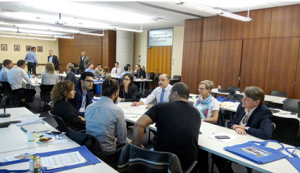 The priority area of Predictive Maintenance and Optimization (PMO) focuses on correcting inefficient building operation and control by using knowledge of building physics along with Information and Communications Technologies (ICT) and data science methods to analyse building data and develop methods to improve building operation and energy efficiency.
The priority area of Predictive Maintenance and Optimization (PMO) focuses on correcting inefficient building operation and control by using knowledge of building physics along with Information and Communications Technologies (ICT) and data science methods to analyse building data and develop methods to improve building operation and energy efficiency.
A PMO Research Planning Workshop was organized by Natural Resources Canada and hosted by Concordia University in Montreal, Canada, on September 27-28, 2018. Representatives from Australia, Canada, Italy, Japan, Netherlands, Sweden, UK and US participated in the workshop.
The workshop planned preliminary research and identified international collaboration partners. It was agreed to organise these activities in the same structure as a task-sharing International Energy Agency (IEA) Energy in Buildings and Communities (EBC) Technology Collaboration Programme. The research was agreed to be split across four subtasks:
A: Open Data Platform
B: Building Emulator
C: Software as a Service Tools
D: Case Studies / Dissemination
A key outcome of the workshop was wider dissemination and encouragement of participation. If you would like to get involved there is another workshop taking place on the 4/ 5th April 2019 at TNO in Delft in the Netherlands. If you would like to attend please contact Stephen White at stephen.d.white@csiro.au
IC7 collaborates with challenges IC1 and IC6
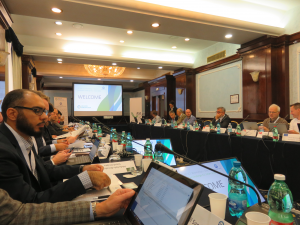 IC7 presented the Fourth Deep Dive Workshop for Innovation Challenge 1: Smart Grids, in November 2018 in Rome. The workshop experts, industry leaders and MI representatives got together to discuss how this emerging technology could help accelerate the growing capacity of renewable energy generation in electricity grids. Heating and cooling assets are a central part of the smart grid and their smart utilisation presents opportunities to significantly reduce carbon emissions. It was agreed that a joint workshop between IC1 and IC7 would follow, and anyone interested in taking part should contact Graeme Maidment at Graeme.Maidment@beis.gov.uk
IC7 presented the Fourth Deep Dive Workshop for Innovation Challenge 1: Smart Grids, in November 2018 in Rome. The workshop experts, industry leaders and MI representatives got together to discuss how this emerging technology could help accelerate the growing capacity of renewable energy generation in electricity grids. Heating and cooling assets are a central part of the smart grid and their smart utilisation presents opportunities to significantly reduce carbon emissions. It was agreed that a joint workshop between IC1 and IC7 would follow, and anyone interested in taking part should contact Graeme Maidment at Graeme.Maidment@beis.gov.uk
Initial discussions took place between IC6 and IC7 via their first teleconference meeting on the 11 December 2018, which aimed to explore the potential of the IC6 Materials Acceleration Platform for the preparation of materials optimized for thermal energy storage (TES) elements. TES experts from UK and Austria, IC6 representative (Mark Kozdras) and the European Commission (Piero De Bonis, Pietro Menna attended the meeting. To get involved in this research, contact Piero De-Bonis at piero.de-bonis@ec.europa.eu
How to get involved with IC7 and any of our 6 Priority areas?
IC7 is about investigating low carbon heating and cooling of buildings with the aim to make low carbon heating and cooling affordable to everyone. It has 23 Project themes within 6 Priority Technological Areas, as shown below.
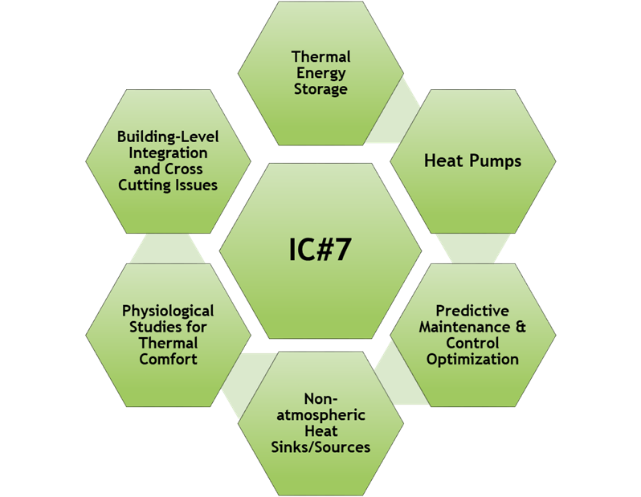
We welcome any involvement with any of priority areas, as well as news items, announcements, etc for inclusion in future newsletters.
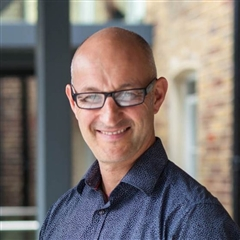
Graeme Maidment has been seconded into the UK Government to support IC7. If you would like to get more involved and find out more about IC7 activities, please contact Graeme at Graeme.Maidment@beis.gov.uk